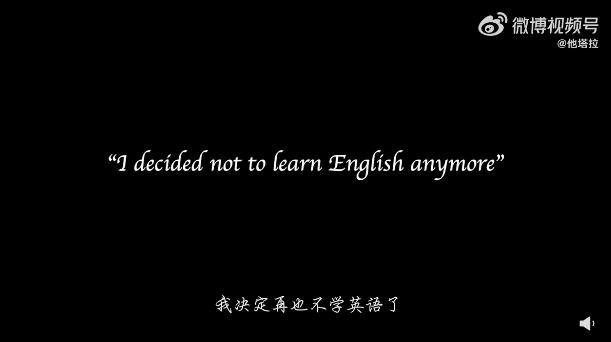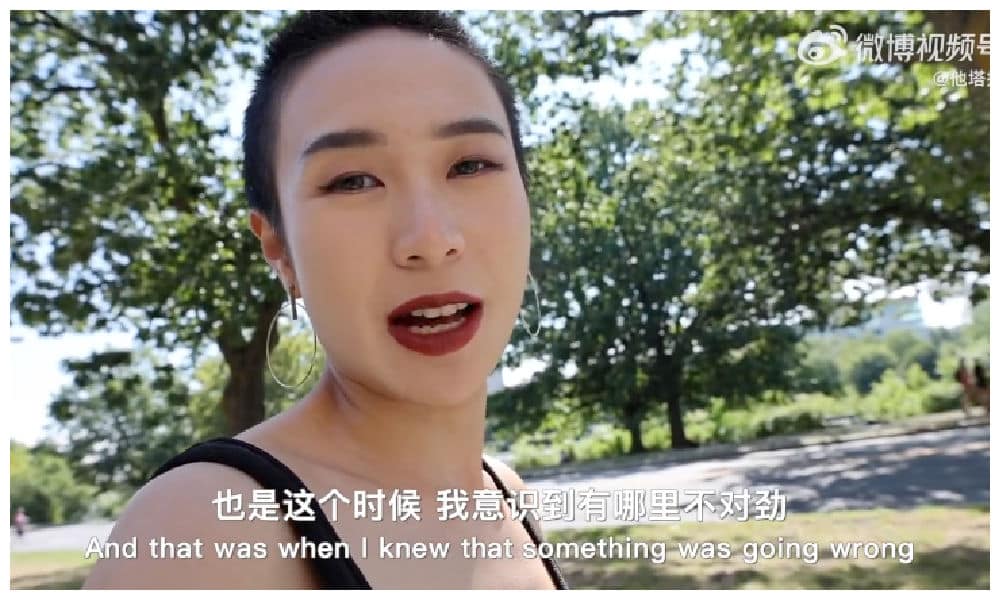“Today is September 1st, 2022. The 20th anniversary of me learning English. And I finally decided not to learn it anymore.” This is the beginning of a 7-minute video posted on social media by the Chinese vlogger ‘Tatala’ (@他塔拉).
The video, which Tatala says was submitted as an assignment for a Harvard course on Language & Equality, received over 122,000 likes and the hashtag “When You Decide Not to Learn English Anymore” (#当你决定以后不学英语#) garnered over 110 million views on Weibo over the past few days.

Although the 24-year-old vlogger is critical of how she is perceived as a Chinese non-native English speaker – claiming she will ‘stop trying’ to learn the language, – she is receiving a lot of backlash from netizens who say she is unaware of her own privilege.
In the video, Tatala says she has always been a good student of English, but that she has never been satisfied throughout her language-learning journey. In the video, she gives multiple examples of how her confidence was affected during the process of studying English.
“I have my name, in my language, that you didn’t even try to enunciate.”
In primary school, Tatala says, her American teacher randomly gave her the name ‘Wency’, which she found hard to pronounce due to the northern Chinese dialect she grew up speaking. She ended up pronouncing ‘Wency’ as ‘Vency’, after which her teacher corrected her again and again: “You are not Vency. You are Wency!” Tatala says: “But he never realized that I was not even Wency. I have my name, in my language, that you didn’t even try to enunciate.”
In middle school, Tatala continued to get high grades in English and she traveled to Britain where she was invited for brunch by a friend, who asked if she preferred ham or turkey. When Tatala asked her friend “what’s the difference?”, she was laughed at by her friend and their mum, who then proceeded to explain the difference between a pig saying ‘oink oink’ and a turkey saying ‘clunk clunk.’ Tatala explains: “I just didn’t know the vocabulary. It’s not that I’m too stupid to recognize animals.”
Although Tatala says her confidence in speaking English peaked during high school, it vanished once she became an international student in Australia, where she had great difficulties understanding what local people were talking about. When she struggled to comprehend English-language works by authors such as Bourdieu or Butler, she worked harder and got high grades, but she was still not satisfied and started dreading her studies.

Tatara then explains: “I realized something went wrong when I took a course called ‘Women in Chinese Literature’ where all the readings were translated from Chinese to English. I read the Chinese version – three chapters per hour – and my Australian classmates read the English version – one chapter a day. Some of them reported the course being too hard and some dropped out, because they did not understand the context behind the words. But that’s what I felt for every single class here.”
“Even if I am just not perfect at English, so what? This is my second language.”
Tatala’s ‘light bulb’ moment was when she realized that it was not necessarily her level of English that determined how difficult or easy her life was, but so many other factors relating to language: “Native speakers found their lives easier not because their English is better than mine, it is because they had the ‘good fortune’ to be raised in environments where their native language acquisition coincides with the dominant linguistic group,” Tatala says, explaining that she blamed everything on language alone while the barriers she faced also had to do with her own confidence level, communication skills, and the prejudices of others.
Tatala suggests that when someone feels attacked on how they use language, they might feel attacked as a person since their language is also a part of their identity. At the same time, people also judge others and draw conclusions about their background, personality, or intentions solely based on language knowledge, dialect, or how they use a single word.
Tatala’s conclusion is that her use of English is not a result of her not speaking “perfect English” but just a “plurality of [her] identity.” Although she mentions she got into Harvard, she says she is determined to “stop learning English” and to just use language as a “tool” instead.
She says: “Even if I am just not perfect at English, so what? This is my second language. This is the lingua franca I was pushed to learn. No matter how well or how bad I speak English, I will have my voice. Ethic minority, Chinese, Asian, I will have my serpent’s tongue, my woman’s voice, my international student’s voice, my influencer’s voice – I will overcome the tradition of silence.”
Tatara’s video triggered online discussions on Weibo on learning English, but perhaps in a different way than Tatala might have expected it to.
Since Tatala’s English level is so high, and she is an Ivy League student, many people do not relate to the struggles she encountered when speaking English at her level. On the contrary, many just hope to reach such a level of English that they would be able to face these kinds of struggles at all.
“Since you decided not to study English in the future, why don’t you drop out of Harvard and come back?”
“After watching this video, I decided I want to try my best to study English, improve my vocabulary and speaking skills, and I will try to get 8.5 in the IELTS, so that one day I can help foreigners by giving directions, eat turkey sandwiches in the UK, listen to the small talk of students in Australia, confidently do international work, and use my proficient English to reflect on culture and language hegemony. But I realize it is very unlikely for me to attain that goal in my lifetime.”
“I watched her video and gosh, what can I say, it’s like those experts suggesting it’s better to buy a house than to rent one,” another blogger says, suggesting Tatala is too privileged to see that many people do not have the luxury to stop studying English because of linguistic hegemony.
“Since you decided not to study English in the future, why don’t you drop out of Harvard and come back?” another Weibo user wrote.
There were also people defending Tatala, suggesting that her point was not to discourage others from studying English: “What she expresses in the video is to use English as ‘a tool’ and not to reject a person because you reject their language,” one commenter wrote, with one netizen adding: “The ‘not learning English anymore’ part actually means she is no longer pursuing the cultural identity behind the language.”
Another person posted: “Some of the people here either have problems understanding or they just have bad intentions. ‘Not learning English anymore’ was just an opening line, what the vlogger is conveying here is the prejudice and discrimination in linguistics, which is a common phenomenon in the context of American culture. Ofcourse, we can’t deny the ‘privilege’ of the vlogger, but this doesn’t change the fact that she has come up with though-provoking content.”
“She is saying you should have pride in your mother tongue, she is not really saying you should not learn English. She’s at Harvard – ofcourse that’s not what she’s gonna say.”
Other Weibo users said that they felt that Tatala should not have used a ‘clickbait’ title for a video that discusses cultural confidence. “It’s just awkward that this has even become a trending topic,” one person wrote.
“Not learning English or another foreign language is just unacceptable, especially for students who are still in school. But since our requirements are different, the levels we reach in speaking a foreign language will be different. Because of different cultures and upbringings, we will inescapably have communication barriers between us and native speakers. But we must try hard, because it is always good to have a greater understanding of other cultures and customs. Just don’t be too demanding.”
You can watch Tatala’s video here.
By Manya Koetse
Get the story behind the hashtag. Subscribe to What’s on Weibo here to receive our weekly newsletter and get access to our latest articles:
Spotted a mistake or want to add something? Please let us know in comments below or email us. First-time commenters, please be patient – we will have to manually approve your comment before it appears.
©2022 Whatsonweibo. All rights reserved. Do not reproduce our content without permission – you can contact us at info@whatsonweibo.com.
The post “I Decided Not To Learn English Anymore” Video Goes Viral on Chinese Social Media appeared first on What's on Weibo.